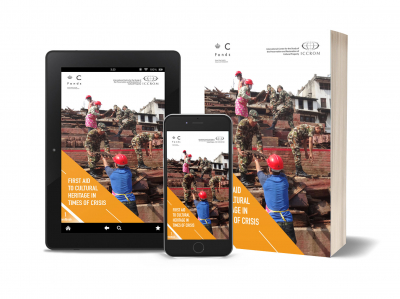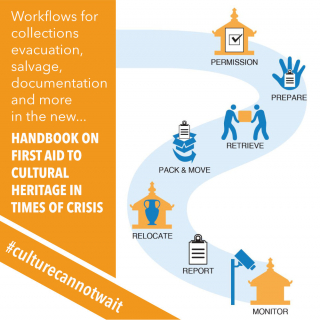ICCROM and the Prince Claus Fund have published an innovative handbook and toolkit on First Aid to Cultural Heritage in Times of Crisis, for free download.
When disasters strike, local communities are the first to try and safeguard their cultural heritage, however their ability to intervene is often greatly reduced during complex and multi-faceted humanitarian crises. At the same time, first responders may not always be aware of what is culturally important, and they often lack the training to handle heritage objects and structures, and meet the specific needs of those who bear traditional knowledge.
First Aid to Cultural Heritage in Times of Crisis is a two-part publication created for the various actors involved in an emergency. It provides a practical method and a set of ready-to-use tools for securing endangered cultural heritage, both tangible and intangible. The user-friendly workflows help readers to plan and implement coordinated cultural rescue and risk reduction operations that involve local communities, heritage custodians, emergency responders and humanitarians.
Written with the key guiding philosophy of ensuring an inclusive attitude and respect for diversity while at the same time interlocking humanitarian assistance with cultural heritage first aid, this resource provides an essential, ethical framework that will lead to successful outcomes.
The cultural heritage first aid workflows and methodologies have been field tested in Haiti, Iraq, Syria, Nepal, Philippines and India, yet this is the first time they have been codified into a comprehensive tool that is accessible to anybody.
The resource has multiple uses: it will help to improve emergency preparedness within cultural heritage institutions, serve as a reference to train others, and act as a guide for planning and implementing coordinated cultural heritage first aid.
The First Aid to Cultural Heritage in Times of Crisis Handbook and Toolkit is the outcome of nearly a decade of field experience gained by ICCROM, and a close partnership between ICCROM, the Prince Claus Fund and the Smithsonian Cultural Rescue Initiative. It has been developed to answer to the increasing need for cultural heritage professionals and humanitarians alike to have a reliable and user-friendly reference that integrates heritage safeguarding into emergency and recovery activities, offering standard operating procedures that are applicable in almost any crisis context.
Who will be interested in reading it?
- Cultural heritage professionals and institutions that would like to develop coordinated emergency plans.
- Community-based organizations and humanitarian aid professionals who are working to enhance disaster resilience in-risk prone regions of the world.
- Civil protection, civil defence and military personnel, firefighters, and others in charge of protecting communities and their assets during disasters and conflicts.
What does it feature?
- The Handbook offers step-by-step instructions and real-life case examples. It walks readers through the three phases of cultural heritage First Aid – (1) situation analysis; (2) post event, on-site damage and risk assessment; (3) security and stabilisation, which collectively lead to early recovery.
- The phases include workflows and procedures that resemble those followed by emergency responders and humanitarian aid professionals, making in-field coordination possible.
- The layout and language is simple and easy to understand.
- It is interactive, so you can move quickly through the sections in order to arrive at what you need.
- Diagrams, photos and drawings illustrate the text for easy reference.
- A glossary and several references allow readers to deepen their understanding of concepts and materials.
- The toolkit is rich with checklists, templates and tips that can be customised to any situation.
Download it, save it to your phone, and share it with as many people as possible so that together we can improve emergency preparedness and response, and build resilience for cultural heritage worldwide.
“The most valuable aspect of the new FAC Handbook and Toolkit is its practicality. Bursting with direct advice on how to document, salvage, and stabilize nearly the entire breadth of cultural heritage, this resource is the missing piece between disaster planning and on-the-ground disaster response work.” – Corine Wegener, Director of the Smithsonian Cultural Rescue Initiative, USA
"In 2017, I organized a course on First Aid for the first time in Syria. It has had a great impact on the professionals of the city of Homs as it highlighted the significant role that heritage institutions and professionals can play in preparing for a crisis. They started thinking differently about the role of heritage in building peace in our society. Many organizations subsequently asked to replicate the course in other Syrian cities. The next step is using the handbook and toolkit to stabilize heritage in the old city of Homs. The conflict in Syria will be over one day, and I believe that FAC will be a great tool for raising awareness and showing us how to recapture the beauty of Syrian cultural heritage." – Lama Abboud, Syrian cultural heritage professional and First Aid trainer
“The First Aid methodology has been successfully implemented and appreciated during my training sessions and workshops during the last 3 years in different countries of Latin America and the Caribbean. Now this handbook will further help to communicate my work and achieve our mission in a more enjoyable, comprehensive and effective way.” – Samuel Franco Arce, President of the Regional Alliance of ICOM for Latin America and the Caribbean, Member of the ICOM Disaster Risk Management Committee and Blue Shield Guatemala
“Your timely help in sharing the [still unpublished] Handbook and Toolkit was a key factor in the entire first aid and rescue operations to save the cultural heritage of Kerala.” – Surya Prasanth, Conservation Architect, Kerala Heritage Rescue Initiative, India


